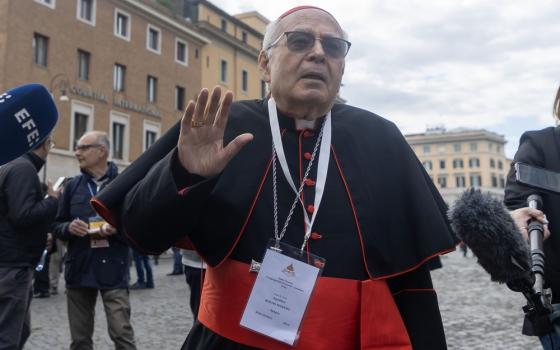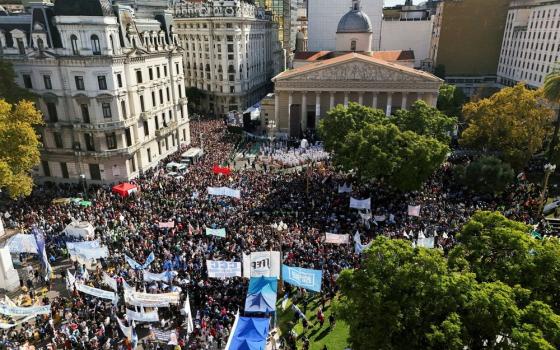
U.S. victims of sexual abuse by Catholic clergy say the Vatican should publicly rebuke the religious order that fought to keep abusers' names out of a damning report that details thousands of crimes against minors in Ireland.
The 2,600-page report, released May 20, describes sexual and violent crimes committed against thousands of young Catholics who lived in residential schools run by religious orders between 1930 and 1990.
Dominican Fr. Thomas Doyle, a canon lawyer and advocate for those abused by priests, described the report as “horrifying” even to someone with his long experience in dealing with cases of sex abuse because as it is presented in the report “this brutal and unspeakable behavior by religious and clerics toward children … was not random but institutionalized.”
Eight chapters of the report were devoted to institutions run by the Irish Christian Brothers, whose schools cared for more boys than all the other religious-run institutions put together.
"The more sadistic and abusive of these brothers were sent to these schools intentionally,” he said. “It is shocking even to me to see that leadership of religious orders and educators in Ireland not only condoned this nightmare, they didn’t look the other way. They looked right at it and made it happen.
A May 20 statement by Brother Edmund Garvey, a spokesman for the order, said, "We apologize openly and unreservedly to all those who have been hurt -- either directly or indirectly -- as a result of the deplorable actions of some brothers or by the inaction or inappropriate action of the congregation as a whole.
"We are deeply sorry for the hurt caused. We are ashamed and saddened that many who complained of abuse were not listened to," he said.
"We acknowledge and regret that our responses to physical and sexual abuse failed to consider the long-term psychological effects on children," he said.
But the Christian Brothers also successfully sued to keep the names of its members out of the report.
"The Vatican has to take real action," said David Clohessy, national director for the U.S.-based Survivors Network of Those Abused by Priests. "The Vatican should publicly censure and, in any way possible, discipline the Christian Brothers for having the audacity to take legal action to conceal predator's names."
The five-volume report by Ireland's Commission to Inquire Into Child Abuse cited "a climate of fear, created by pervasive, excessive and arbitrary punishment" that "permeated most of the institutions and all those run for boys. Children lived with the daily terror of not knowing where the next beating was coming from."
The Christian Brothers' leader in Ireland, Brother Kevin Mullan, told the Associated Press that the order fought to keep names secret because "perhaps we had doubts about some of the allegations."
"But on the other hand, I'd have to say that at this stage, we have no interest in protecting people who were perpetrators of abuse," Mullan said, adding that the order will "cooperate fully with any investigation or any civil authority seeking to explore those matters."
A number of victims in Ireland said the report is not complete without the names, and the matter is not closed until perpetrators are punished for their crimes. Clohessy agreed and said the church should punish abusers, even if the state does not.
Fr. Federico Lombardi, the Vatican's top spokesman, said May 21 that the Vatican would defer to Irish bishops to comment on the report.
The 2,600-page report of the Commission to Inquire Into Child Abuse, published May 20, "throws light on a dark period of the past," said Cardinal Sean Brady of Armagh, Northern Ireland, president of the Irish Catholic Bishops' Conference.
"The publication of this comprehensive report and analysis is a welcome and important step in establishing the truth, giving justice to victims and ensuring such abuse does not happen again," the cardinal said. "This report makes it clear that great wrong and hurt were caused to some of the most vulnerable children in our society. It documents a shameful catalog of cruelty -- neglect, physical, sexual and emotional abuse -- perpetrated against children."
The report said abuse -- physical and sexual -- was endemic in government institutions for boys run by religious between 1940 and the late 1970s. Although girls were subjected to predatory sexual abuse by male employees or visitors, sexual abuse was not systemic in girls' institutions, the report said.
"I am profoundly sorry and deeply ashamed that children suffered in such awful ways in these institutions," Cardinal Brady said. "Children deserved better, and especially from those caring for them in the name of Jesus Christ."
The cardinal said the Catholic Church "remains determined to do all that is necessary to make the church a safe, life-giving and joyful place for children."
Dublin Archbishop Diarmuid Martin said the victims' "stories of horrible abuse are, in many cases, stomach-turning; their courage in telling their stories (is) admirable."
Archbishop Martin said all church organizations involved in the report should seriously examine "how their ideals became debased by systematic abuse."
"We must find ways of ensuring that the cries and anxieties of children are heard and listened to," he said. "This is not a report to be put on a shelf -- it's a real cry for a new look at the way we care for our children. If we truly regret what happened in the past, we must commit ourselves to a very different future."
Fr. Doyle, the victims' rights advocate, said the report "is so shocking that I believe that it will be very difficult for a lot of people to internalize and accept the reality that this report talks about and I think what it says goes far beyond the abuse it describes. I think it says that there’s something profoundly wrong with the institutional church as we know it and as we have supported it.”
Doyle, who has served as a consultant and an expert witness on behalf of victims in hundreds of cases said the big question for Ireland is: “What happens now? This is not simply an historical phenomenon that is no longer with us. The survivors are still with us; the celibate isolated ecclesiastical culture that created this is still with us. I think if anything it supports what we’ve been saying over here for some time—this demands a deep and fearless examination of the celibate clerical subculture to find out why this happened, why there’s still denial
[This article was compiled from reports from Tom Roberts of NCR, Daniel Burke of Religion News Service and Cian Molloy Catholic News Service.]





